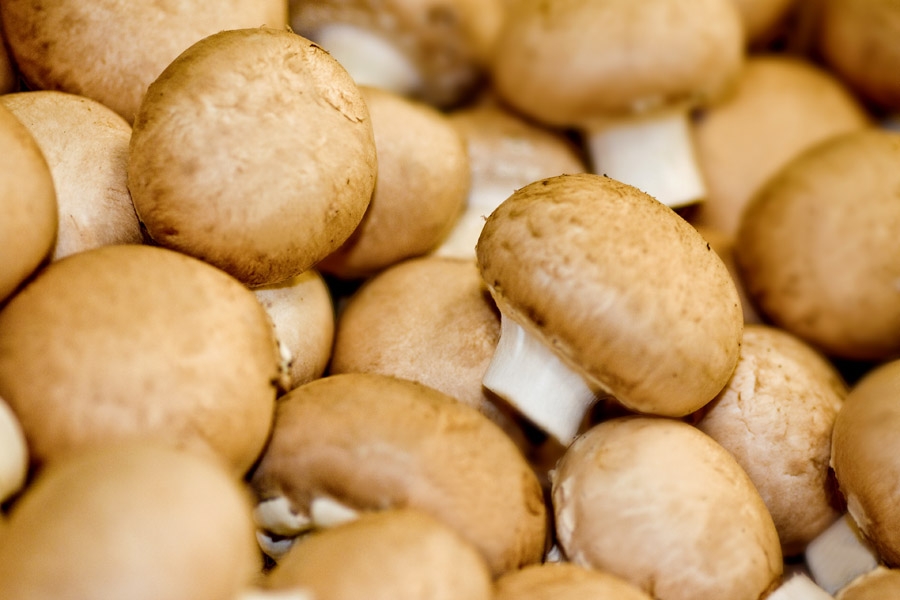Nutritional values
On the basis of analysis of the chemical composition of edible mushrooms, it has been claimed that champignons are food products providing a variety of microelements that are beneficial for health, such as Proteins, Fats, Carbohydrates, Vitamins, and Minerals. All those elements are important for the proper development of the body, as well as for maintaining its basic functions. The mushrooms can constitute a basis of the food portion of a healthy adult.
The high content of protein, cellulose (chitin), and water.
All mushrooms contain 80-90 % of water. Nevertheless, the dry matter consists mainly of proteins. That is why mushrooms are sometimes called “the meat of the forest”. The aforementioned proteins consist of almost all amino acids possible, including those exogenous ones, which cannot be synthesized in organisms and must be provided with food. A significant amount of amino acids present in the proteins makes it possible to classify mushrooms as nutritious food products. According to some scientists, the biggest amount of proteins can be found in champignons and king boletes. It is worth indicating that fresh mushrooms contain more proteins than dried ones. A specific type of cellulose – chitin, is present in mushrooms as well. One of its main functions is to keep the mushrooms inflexible. Chitin polysaccharides present in mushrooms prevent allergies and improve the functioning of the immune system. Chitin, while consumed, acts similarly to cellulose – it is not processed, but it improves important functions of the digestive system. On the one hand, it reduces appetite by creating the feeling of fullness, and it prevents the absorption of fats on the other hand.
Fats
Mushrooms contain about 1-10 % of fat (including polyunsaturated fatty acids, which decrease the possibility of arteriosclerosis development). They are easily digested (92 to 97 %) and are pretty similar to animal fats in character. The fruitbodies of some mushrooms contain also organic acids. In the case of champignons, those are for example malic acid, citric acid, tartaric acid, and fumaric acid. Champignons are low in fat (consisting of some unsaturated fatty acids, which are beneficial for our health, and lacking in any trans fatty acids), which makes them a perfect complement to our dietary habits.
Carbohydrates
There are significantly fewer carbohydrates in mushrooms, especially comparing them to proteins. Moreover, they are different than those produced by plants. Carbohydrates in mushrooms are well absorbed by the organism and that is why we tend to feel full after eating a meal containing mushrooms. Taking percentage values into consideration, there is about 2 to 10 % of carbohydrates in mushrooms. Digestion of those carbohydrates is additionally pretty high. Carbohydrates in mushrooms are absorbed easier than in the case of those contained in plants, and similar to those in milk and white bread.
Vitamins and minerals
Mushrooms are rich in both vitamins and mineral salts. They are the main source of vitamins from the B group, which are important for our nervous system. The presence of B3 and B5 is comparable to their amount in other nutritious products and the amount of B1 vitamin is comparable to its content in grains.
Moreover, mushrooms contain a moderate amount of folates, the amount of which is comparable to this in plants. Bio-accessibility of folates in mushrooms seems to be comparable to the accessibility of folic acid, in contrast to some vegetables, such as peas and spinach, where the bio-accessibility is significantly lower. The folate content is the highest in the case of oyster mushrooms and brown champignons. Folates contain, among others, folic acid, which is also known as the B9 Vitamin. Niacin, which is also referred to as the PP vitamin, can be found in mushrooms in similar amounts to its content in yeast. What is more, vitamins, such as A and D (fruits and vegetables do not contain them at all, but there can be found in abundance in champignons) can also be found in mushrooms. The presence of the C Vitamin is confusing, as some sources say that there is a lot of it in mushrooms, whereas some state the contrary. The content has been proven to be smaller than in the case of fruits but higher than in vegetables.
Mushrooms are also a vital source of important minerals. They are one of the most abundant sources of selenium, playing an important role in the immune system, having strong antitumor and autoxidizing effects, and preventing cells from damage that may cause heart concerns and some kinds of tumors. They are also rich in ergothioneine, which is a natural antioxidant, that helps to protect cells. Oyster mushrooms, which are increasingly popular in Poland, contain folic acid, as well as the B-D glycan, which has an antitumor effect. Beta-glycan, which can be found in numerous species of mushrooms, stimulates our immune system, decreases the frequency of allergies, and participates in physiological processes connected with the digestion of fats and monosaccharides.
What is more, numerous mineral salts have been found in mushrooms: potassium, phosphorus, iron, calcium, and sodium, as well as some microelements: zinc, copper, iodine, manganese, potassium, and lead.





